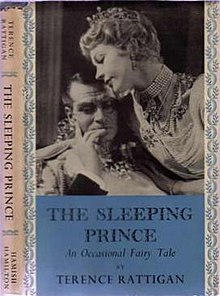
Vivien Leigh, styled as Lady Olivier after 1947, was a British actress. She won the Academy Award for Best Actress twice, for her performances as Scarlett O'Hara in Gone with the Wind (1939) and Blanche DuBois in the film version of A Streetcar Named Desire (1951), a role she had also played on stage in London's West End in 1949. She also won a Tony Award for her work in the Broadway musical version of Tovarich (1963). Although her career had periods of inactivity, in 1999 the American Film Institute ranked Leigh as the 16th-greatest female movie star of classic Hollywood cinema.

Laurence Kerr Olivier, Baron Olivier, was an English actor and director who, along with his contemporaries Ralph Richardson and John Gielgud, was one of a trio of male actors who dominated the British stage of the mid-20th century. He also worked in films throughout his career, playing more than fifty cinema roles. Late in his career he had considerable success in television roles.

Zoë Wanamaker is an American-British actress who has worked extensively with the Royal Shakespeare Company and the National Theatre. Wanamaker was appointed a Commander of the Order of the British Empire in 2001 by Queen Elizabeth II. She has received numerous accolades including a Laurence Olivier Award and nominations for three BAFTA Awards, and four Tony Awards.
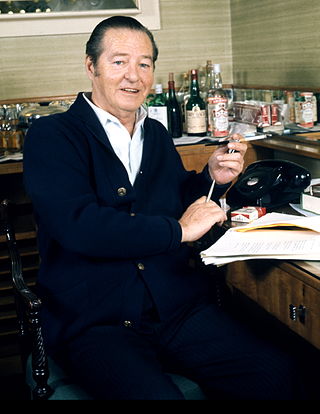
Sir Terence Mervyn Rattigan was a British dramatist and screenwriter. He was one of England's most popular mid-20th-century dramatists. His plays are typically set in an upper-middle-class background. He wrote The Winslow Boy (1946), The Browning Version (1948), The Deep Blue Sea (1952) and Separate Tables (1954), among many others.

Richard III is a 1955 British Technicolor film adaptation of William Shakespeare's historical play of the same name, also incorporating elements from his Henry VI, Part 3. It was directed and produced by Laurence Olivier, who also played the lead role. Featuring many noted Shakespearean actors, including a quartet of knights, the film depicts Richard plotting and conspiring to grasp the throne from his brother King Edward IV, played by Sir Cedric Hardwicke. In the process, many are killed and betrayed, with Richard's evil leading to his own downfall. The prologue of the film states that history without its legends would be "a dry matter indeed", implicitly admitting to the artistic licence that Shakespeare applied to the events of the time.

The Prince and the Showgirl is a 1957 British romantic comedy film starring Marilyn Monroe and Laurence Olivier, who also served as director and producer. The screenplay written by Terence Rattigan was based on his 1953 stage play The Sleeping Prince. The Prince and the Showgirl was filmed at Pinewood Studios in Buckinghamshire.
Frances Ruffelle is an English musical theatre actress and singer. She won a Tony Award in 1987, and represented the United Kingdom in the 1994 Eurovision Song Contest with the song "Lonely Symphony ", finishing 10th. The song became a UK Top 30 hit.

Bernard Joseph Archard was an English actor who made many film and television appearances.

Irene Lilian Brodrick, Countess of Midleton was a British stage and screen actress of the 1930s, 1940s and 1950s and also a novelist.

Ross is a 1960 play by British playwright Terence Rattigan.
Peter Glenville was an English film and stage actor and director.
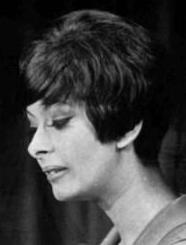
Monica Evans is an English retired actress known for her portrayal of Cecily Pigeon in Neil Simon's The Odd Couple. She was in the original Broadway cast for its entire run, then appeared in the film version in 1968, and finally appeared in some episodes of the first season of the television series based on the play, all in the same role, alongside Carole Shelley as her sister Gwendolyn Pigeon. She also provided voices for the two animated films for Walt Disney Productions, such as The Aristocats (1970), as Abigail Gabble and Robin Hood (1973) as Maid Marian, a vixen.

The Girl Who Came to Supper is a musical with a book by Harry Kurnitz and music and lyrics by Noël Coward, based on Terence Rattigan's 1953 play The Sleeping Prince. The musical premiered on Broadway in 1963.
Lia Williams is an English actress and director, both on stage, in film and television. Her roles have included playing Wallis Simpson in The Crown, May 33rd for which she was nominated for a BAFTA, The Missing (2016), Kiri (2016), His Dark Materials (2019-2022), and The Capture (2019-present).

Rosamund Mary Greenwood was a British actress who was active on screen from 1935 until 1990.
Robin Midgley was a director in theatre, television and radio and responsible for some of the earliest episodes of Z-Cars and for the television version of the Royal Shakespeare Company's Wars of the Roses.
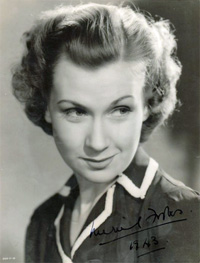
Meriel Forbes, Lady Richardson was an English actress. She was a granddaughter of Norman Forbes-Robertson and great-niece of Sir Johnston Forbes-Robertson. After making her stage debut with her father's touring company in 1929 she progressed via provincial repertory to the West End, where she appeared continually from the 1930s to the 1970s.
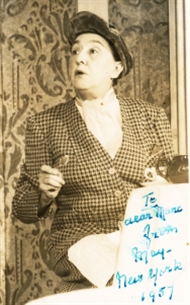
May Hallatt was an English actress, born in Scarborough. Baptised at St Michael on the Mount, Lincoln, on 13 Jan 1884 she was the daughter of William Henry Hallatt, actor, and Carrie Sydney.
A film of Macbeth with Laurence Olivier as director and in the lead role was a project for which Olivier was ultimately unable to gain financing.

Margaret Courtenay was a British actress best known for her British theatre roles during the 1970s and 1980s. She was a member of the Royal Shakespeare Company.
